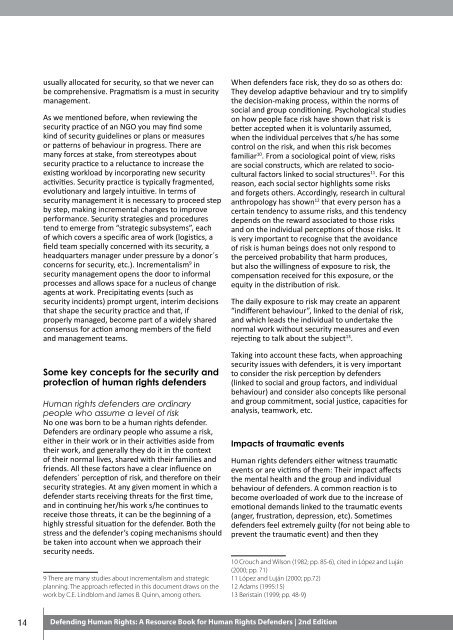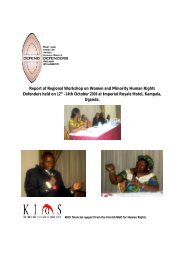Defending Human Rights: A Resource Book for Human
Defending Human Rights: A Resource Book for Human
Defending Human Rights: A Resource Book for Human
Create successful ePaper yourself
Turn your PDF publications into a flip-book with our unique Google optimized e-Paper software.
usually allocated <strong>for</strong> security, so that we never can<br />
be comprehensive. Pragmatism is a must in security<br />
management.<br />
As we mentioned be<strong>for</strong>e, when reviewing the<br />
security practice of an NGO you may find some<br />
kind of security guidelines or plans or measures<br />
or patterns of behaviour in progress. There are<br />
many <strong>for</strong>ces at stake, from stereotypes about<br />
security practice to a reluctance to increase the<br />
existing workload by incorporating new security<br />
activities. Security practice is typically fragmented,<br />
evolutionary and largely intuitive. In terms of<br />
security management it is necessary to proceed step<br />
by step, making incremental changes to improve<br />
per<strong>for</strong>mance. Security strategies and procedures<br />
tend to emerge from “strategic subsystems”, each<br />
of which covers a specific area of work (logistics, a<br />
field team specially concerned with its security, a<br />
headquarters manager under pressure by a donor´s<br />
concerns <strong>for</strong> security, etc.). Incrementalism 9 in<br />
security management opens the door to in<strong>for</strong>mal<br />
processes and allows space <strong>for</strong> a nucleus of change<br />
agents at work. Precipitating events (such as<br />
security incidents) prompt urgent, interim decisions<br />
that shape the security practice and that, if<br />
properly managed, become part of a widely shared<br />
consensus <strong>for</strong> action among members of the field<br />
and management teams.<br />
Some key concepts <strong>for</strong> the security and<br />
protection of human rights defenders<br />
<strong>Human</strong> rights defenders are ordinary<br />
people who assume a level of risk<br />
No one was born to be a human rights defender.<br />
Defenders are ordinary people who assume a risk,<br />
either in their work or in their activities aside from<br />
their work, and generally they do it in the context<br />
of their normal lives, shared with their families and<br />
friends. All these factors have a clear influence on<br />
defenders´ perception of risk, and there<strong>for</strong>e on their<br />
security strategies. At any given moment in which a<br />
defender starts receiving threats <strong>for</strong> the first time,<br />
and in continuing her/his work s/he continues to<br />
receive those threats, it can be the beginning of a<br />
highly stressful situation <strong>for</strong> the defender. Both the<br />
stress and the defender’s coping mechanisms should<br />
be taken into account when we approach their<br />
security needs.<br />
9 There are many studies about incrementalism and strategic<br />
planning. The approach reflected in this document draws on the<br />
work by C.E. Lindblom and James B. Quinn, among others.<br />
When defenders face risk, they do so as others do:<br />
They develop adaptive behaviour and try to simplify<br />
the decision-making process, within the norms of<br />
social and group conditioning. Psychological studies<br />
on how people face risk have shown that risk is<br />
better accepted when it is voluntarily assumed,<br />
when the individual perceives that s/he has some<br />
control on the risk, and when this risk becomes<br />
familiar 10 . From a sociological point of view, risks<br />
are social constructs, which are related to sociocultural<br />
factors linked to social structures 11 . For this<br />
reason, each social sector highlights some risks<br />
and <strong>for</strong>gets others. Accordingly, research in cultural<br />
anthropology has shown 12 that every person has a<br />
certain tendency to assume risks, and this tendency<br />
depends on the reward associated to those risks<br />
and on the individual perceptions of those risks. It<br />
is very important to recognise that the avoidance<br />
of risk is human beings does not only respond to<br />
the perceived probability that harm produces,<br />
but also the willingness of exposure to risk, the<br />
compensation received <strong>for</strong> this exposure, or the<br />
equity in the distribution of risk.<br />
The daily exposure to risk may create an apparent<br />
“indifferent behaviour”, linked to the denial of risk,<br />
and which leads the individual to undertake the<br />
normal work without security measures and even<br />
rejecting to talk about the subject 13 .<br />
Taking into account these facts, when approaching<br />
security issues with defenders, it is very important<br />
to consider the risk perception by defenders<br />
(linked to social and group factors, and individual<br />
behaviour) and consider also concepts like personal<br />
and group commitment, social justice, capacities <strong>for</strong><br />
analysis, teamwork, etc.<br />
Impacts of traumatic events<br />
<strong>Human</strong> rights defenders either witness traumatic<br />
events or are victims of them: Their impact affects<br />
the mental health and the group and individual<br />
behaviour of defenders. A common reaction is to<br />
become overloaded of work due to the increase of<br />
emotional demands linked to the traumatic events<br />
(anger, frustration, depression, etc). Sometimes<br />
defenders feel extremely guilty (<strong>for</strong> not being able to<br />
prevent the traumatic event) and then they<br />
10 Crouch and Wilson (1982; pp. 85-6), cited in López and Luján<br />
(2000; pp. 71)<br />
11 López and Luján (2000; pp.72)<br />
12 Adams (1995:15)<br />
13 Beristain (1999; pp. 48-9)<br />
14<br />
<strong>Defending</strong> <strong>Human</strong> <strong>Rights</strong>: A <strong>Resource</strong> <strong>Book</strong> <strong>for</strong> <strong>Human</strong> <strong>Rights</strong> Defenders | 2nd Edition








